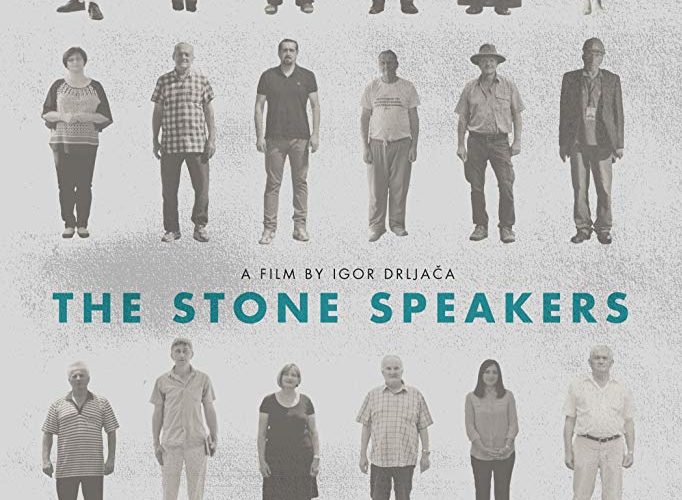Writer/director Igor Drljaca takes us on a contemplative tour through four towns in Bosnia-Herzegovinia with his documentary The Stone Speakers. We never hear him speak nor watch any of his subjects respond. All we hear are their disembodied words atop static portraits of them standing against the backdrop of their environment and all we see are the remnants of and creation from destruction post-World War II and civil ethnic unrest. There are the locals lamenting their dying land as its unable to support any sort of stable economy after the fall of communism led to both industry and youth leaving. And there are those excited about the influx of tourism their new capitalist mindset presents through the commoditization of their nation.

These disparate perspectives are intertwined throughout with nobody commenting on what others say nor allowing their thoughts to be impacted by it — each explains his/her viewpoint in a vacuum before Drljaca merges them together into snapshots of a place caught between past and future. We get the Christian worshipping of the Virgin Mary in Medjugorje; the spiritual healing of pyramids of questionable origins in Visoko; the artistic renaissance of Višegrad as it seeks to make up for having missed Europe’s own “rebirth” between 1300 and 1600; and the salt lakes of Tuzla literally serving as a reminder of just how precarious peace and security remain. There are competing definitions of Anti-Fascism, an unrelenting religious divide, and the many foreign “pilgrims” who visit to complete the brochure’s must-see highlights.
It’s a fascinating format that really allows us to dig into Bosnia-Herzegovinia’s history via its disparate groups (Bosniaks, Serbs, and Croats). Some talk about God while others laud the great kings of old. Some speak about the employment opportunities created by expensive projects while others struggle to accept the demise of their old lucrative trades. The parallels to America today are impossible to ignore when you think about how partisan politics are and how brazen populations of racist and xenophobic citizens have become. There are those working to help laborers in dying industries readjust and learn today’s occupational equivalents while others stand on their pulpits to lie about how those industries will come back. And the chasm simply grows wider as compromise is replaced by indignation.

As an outsider it’s tough to figure out where truth ends and fiction begins if you can even delineate between the two. Usually you get revisionist history from warring nations that hate one another (see the vast differences in the accounts of past relationships from Israel and Palestine for an example). So this country becomes a rare insulated presentation of how we skew facts through perception and how those accounts then dictate how future generations are raised. How have the wars kept Bosnia-Herzegovinia segmented into factions despite the Dayton Peace Accords? How has the fall of oppressive regimes improved their way of life and how has its learning curve rendered progress stagnant? We hear names of heroes and villains and sometimes the same one intrinsically earns both labels.
The Stone Speakers is thus an objective work constructed from subjective input. Drljaca isn’t interested in finding solutions or explaining any unbiased context since doing so would do no good. He craves the conflicts and the anthropological impact of it. How does a project many see as a drain on the economy increase cultural significance? Who benefits from an increase of tourism and how are they helping those growing angrier and angrier through a stubbornness believed to be a product of betrayal? And where do you draw the line between exploitation and business savvy? The victors ultimately write the history books and it seems this period of coexistence has yet to officially crown its winner. The longer such dissent festers, the greater chance peace dissolves into chaos.

Seeing this divide without animosity becomes a powerfully eye-opening experience because you don’t get a chance to side with one idea above the next. We’re listening to opinions devoid of fact-checking from people who are equally even-keeled in their delivery and one-hundred percent confident in what they’re saying. Drljaca therefore presents these subjects in their natural echo chambers in order for us to catch the subtle differences. These are everyday people being given an identical platform to talk about their home and where it is today as opposed to the past. And for many no actual dissonance exists. America’s strength is in its ability to counterpunch in real-time and face-to-face. In a country that’s willfully kept its factions apart, each “truth” becomes cemented without the chance to learn.
The Stone Speakers screened at the Berlin Film Festival.
Follow our festival coverage here.

